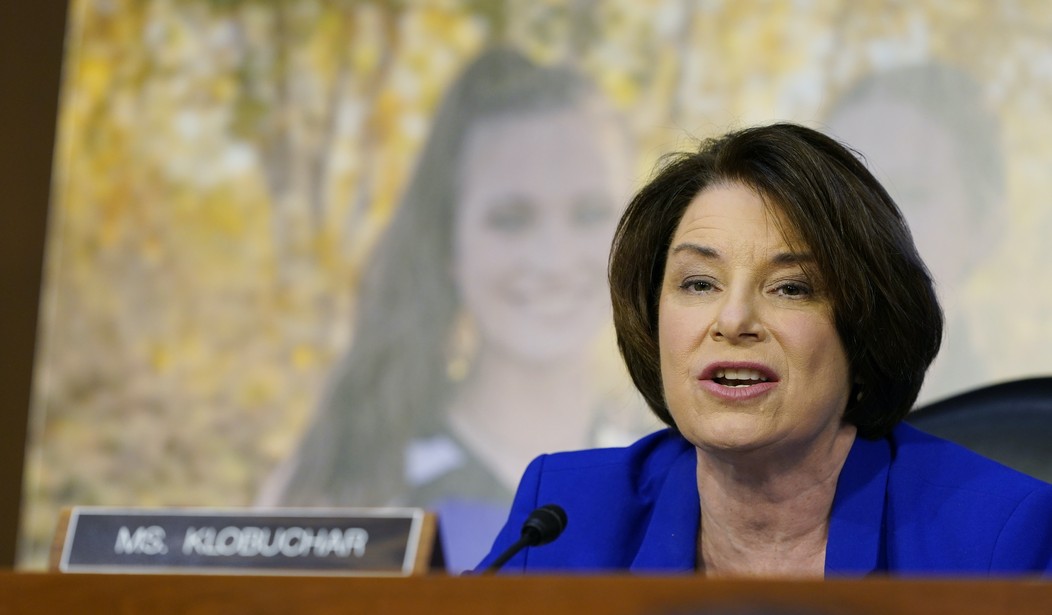There was a time when people on the hard left at least pretended to value the idea of free speech. They gave ardent lip service to the notion that people should be allowed to express themselves freely, even if their views were abhorrent.
But at this point, it seems that at least some of them are taking off the mask and, in the words of Phil Collins, are showing their “True Colours.” (Yes I know Cyndi Lauper originally sang the song…but I like Collins’ version better.)
Two Democratic senators on Thursday introduced legislation that would alter Section 230 in a way that would allow the federal government to punish Big Tech companies for not adequately censoring views that are not Democrat-approved. Reuters reported:
The legislation introduced by Amy Klobuchar and Ben Ray Lujan requires internet platforms such as Facebook (FB.O) and Alphabet’s Google (GOOGL.O) to take down health and vaccine-related misinformation during public health emergencies or be held liable for that failure.
It also directs the Department of Health & Human Services to issue guidelines on what constitutes health misinformation.
Sen. Klobuchar argued that “these are some of the biggest, richest companies in the world and they must do more to prevent the spread of deadly vaccine misinformation.”
The bill cites a study conducted by the Center for Countering Digital Hate revealing that social media companies did not act on 95 percent of COVID-related “disinformation” that was reported to them. The heads of Twitter, Facebook, and Google have long contended that Section 230 is necessary because it protects online speech while allowing them to moderate content.
Republicans have also been outspoken against Section 230, but for different reasons. Conservatives have pushed for altering the law or doing away with it altogether because Big Tech is biased in favor of the left. They contend that these companies routinely throttle right-leaning content while promoting left-leaning perspectives.
Conservatives are also criticizing President Joe Biden for trying to pressure Facebook to step up its censorship and crack down on opinions regarding the coronavirus and vaccine that do not comport with the narrative being pushed about these issues. White House Press Secretary Jen Psaki acknowledged last week that the administration is monitoring and flagging certain posts they deem problematic.
Sen. Josh Hawley ripped the White House, referring to its behavior as “really scary.” During an appearance on Fox News’ “Special Report” he said:
I think it’s scary. I think it’s really scary to have the federal government of the United States, the White House, compiling lists of people, organizations, whatever, and then going to a private company that, by the way, is a monopoly, Facebook, and saying you need to censor, you need to do something about this, you need to tell these users, these private users at a private company what they can or cannot say.
Hawley also said that people “really have to wonder how private of companies they are” and that if these organizations are bowing to the will of the government, “that looks like they’re starting to operate as a public utility.”
I’ll be fair: There are some Democratic lawmakers who want to target Big Tech companies over concerns about privacy. This is an issue on which conservatives could agree with them.
But while some conservatives are against Section 230 because it allows social media to function as publishers, Democrats oppose the law because it means that the state cannot compel these organizations to censor right-leaning views more than they already are.
Indeed, the leadership of these companies is decidedly left-wing as are their employees. Former workers who were employed by Twitter and Facebook have admitted that they suppress conservative voices more often than those of left-leaning users. Apparently, this isn’t enough for left-leaning politicians.
However, there is good news: Klobuchar’s proposal is likely to go the same way as her abysmal presidential campaign. Even Vox acknowledged that putting her plan into action would be “challenging.” The news outlet noted that “identifying public health misinformation is often complicated” and that “having a government agency decide where to draw that boundary could run into challenges.”
Still, it would be a mistake for conservatives to rest on their laurels. While such an initiative is not likely to materialize at this juncture, it does not mean Democrats and other opponents of free speech aren’t still going to push for this type of action in the future.













